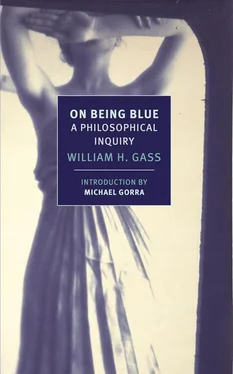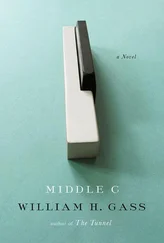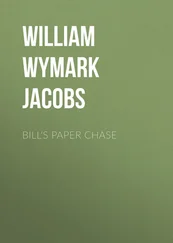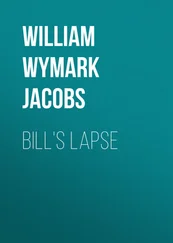So at the sink, what is she thinking ? Let her wash her greens, I go where it’s blue… as blue as the Bloomsday book. ‘Light sob of breath Bloom sighed on the silent bluehued flowers.’ But she is thinking: tomorrow I have to remember to buy more salad oil. Frank likes the green kind with the white specks. It’s on sale. And get some Woolite for the sheep.
Nonsense. I won’t have it. She is thinking of her role as a woman in the world. She has a thing for the fellow next door. That’s me. She is about to embark on an hour-long sexual fantasy during which time she’ll petal up the radishes. We want to know. At once. Everything. And if it’s going to be boring, we want the truth replaced by lies. Most novelists are bought. They will oblige. And even if our own neurotic natures prevent us from enjoying scenes of sodomy and fellatio, we will allow the hero time to ring a pencil with his teeth, or sit — ooo, aaaaah, teehee, oh boy, surprise! — upon a burr or pin or thumb or spike.
Books whose blueness penetrates the pages between their covers are books which, without depriving us of the comfort of our own commode or the sight of our liberal selves, place us inside a manufactured privacy. This privacy is really not that of someone else. It must be artificial because the real world plainly bores us. Impatient, we can’t wait for nature to take its course. When we take our textual tour through the slums, we want crime, violence, starvation, disease, not hours of just sitting around. We want the world to be the world we read about in the papers: all news. What good is my ring if the couple I am using it to spy on make love in darkness once a month, and then are quick, inept, and silent? Better rob banks. The money is always there. What good is my peek at her pubic hair if I must also see the red lines made by her panties, the pimples on her rump, broken veins like the print of a lavender thumb, the stepped-on look of a day’s-end muff? I’ve that at home. No. Vishnu is blue in all his depictions. Lord Krishna too. Yes. The blue we bathe in is the blue we breathe. The blue we breathe, I fear, is what we want from life and only find in fiction. For the voyeur, fiction is what’s called going all the way .
The privacy which a book makes public is nevertheless made public very privately — not like the billboard which shouts at the street, or the movie whose image is so open we need darkness to cover the clad-ass and naked face that’s settled in our seat. A fictional text enters consciousness so discreetly it is never seen outdoors… from house to house it travels like a whore… so even on a common carrier I can quite safely fill my thoughts with obscene adjectives and dirty verbs although the place I occupy is thigh-sided by a parson.
We like that.
Thus between the aesthetically irrelevant demands of the reader and the aesthetically crippling personal worries of the writer, sexuality reaches literature as an idée fixe, an artifically sweetened distortion or an outright lie, while the literature itself leaks quality like a ruptured pipe.
This is not the same shade of blue Henry James had in mind when he invented Ralph Limbert, an author like himself who, as each book disappeared in a neglect as complete as the last tick of the clock, resiliently hoped for a popular success ‘The Next Time.’ Limbert is given the incorruptible artistry and felicitous bad luck always to aim for the mob and hit the few, choosing cheap subjects and enriching them as clay is, modeled into bronze, until in the twilight of his career, when there was to be no ‘next time,’ he accepted the plain inglorious and unromantic loneliness of the creative self. Then it seemed ‘… he had quite forgotten whether he generally sold or not. He had merely waked up one morning again in the country of the blue and had stayed there with good conscience and a great idea.’
Blue as you enter it disappears. Red never does that. Every article of air might look like cobalt if we got outside ourselves to see it. The country of the blue is clear.
• • •
It is not simple, not a matter for amateurs, making sentences sexual; it is not easy to structure the consciousness of the reader with the real thing, to use one wonder to speak of another, until in the place of the voyeur who reads we have fashioned the reader who sings; but the secret lies in seeing sentences as containers of consciousness, as constructions whose purpose it is to create conceptual perceptions — blue in every area and range: emotion moving through the space of the imagination, the mind at gleeful hop and scotch, qualities, through the arrangement of relations, which seem alive within the limits they pale and redden like spanked cheeks, and thus the bodies, objects, happenings, they essentially define.
The condition I describe is not, as one might initially suppose, like that ascribed to Eva Flegen of Mörs, the Maid of Germany, who lived without meat on the smell of a rose, but, paradoxically, every loving act of definition reverses the retreat of attention to the word and returns it to the world. The landscape which emerges from the language which has made it is quite as lovely, vast and curious, as rich and prepossessing, as that of the deity who broke the silence of the void with speech so perfect the word ‘tree’ grew leaves and the syllables of ‘sealion’ swallowed fish.
The misleading miracle of the movies can nevertheless instruct us about prose. The silent film was full of magnificent action and exaggerated gestures as the actors strove to overcome the muteness of their medium. A Chaplin might occasionally manage, but most emotions cannot survive breast-beating. The talkie, on the other hand, while showing us how complicated thoughts and subtle feelings had been nearly snuffed out by the airless absence of speech, also demonstrated how cheap, thin, and stupid both became when the script was weak. Of course the camera fidgets in front of the speaking face. The telephone, a tire screech, the smash of glass, a ringing exchange of shots: these sounds issue from their images; but any conversation which rises above cliché like the first bird requires every photo in its neighborhood to be obedient and serve it. Fiction becomes visual by becoming verbal. The camera understands its enemy, and shuts its eye.
When Leo Feldman, Stanley Elkin’s awesome merchant, enters his department store and is at once assailed by ‘perfumes and facepowders, the mascaras, and polishes bright as sodas,’ will we enter? only if his language enters us the way God’s did Adam at whose bare word, as Sir Thomas Browne reminds us, ‘were the rest of the creatures made.’ Then the language fills the mouth as it was meant to. We feel the need to speak it. Accepting the words as our own, speaking the words as our own, we believe at last in their denotations. ‘Art, art, thought Feldman, impresario of deep disks of rich rouge, pastel as flesh, of fine-grained dusting powders like soft, fantastic sand, of big plush puffs and cunning brushes.’ This silent head-hummed sound we make is not a useless and annoying wail which has been wrenched by lack of oil from the machinery. When we hear ‘big plush puffs’ we do not have to see them, and ‘deep disks of rich rouge’ replace the feel of the tinted grease. Through the physical qualities of the language, Elkin moves his ‘things’ as if to music.
He was obsessed by it, the merchandise laid out like a city, patterned, zoned as neighborhood, and missed nothing on the fluorescently tubed yellow wood and glass horseshoe counters. He knew without touching them the feel of the glass, greasy as plastic from the precious contact of shoppers, their leaned, open-palmed surrenders on the countertops, smudged from their groped investigations, their excited jabs at the glass: ‘There, there —next to the white one.’ (The counters, washed each night, bore a now intrinsic blur, ineffaceable as the cloud on an old watch crystal.) And could almost have told which belts had been sold from the tiers mounted like coiled snakes in their clear oblong boxes. And even which ties, perhaps, hanging thick as a curtain before some gay vaudeville. (Elkin: A Bad Man. )
Читать дальше












